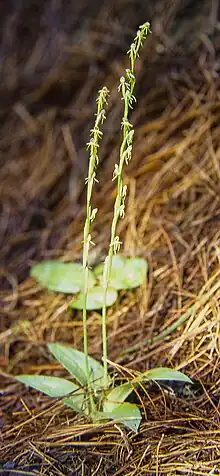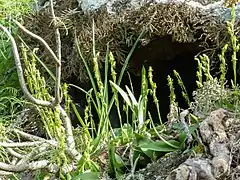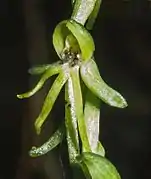Habenaria tridactylites
Habenaria tridactylites, the Canary three-finger orchid, is a species of flowering plant in the family Orchidaceae, native to the Canary Islands. It was first described by John Lindley in 1835.[1]
| Habenaria tridactylites | |
|---|---|
 | |
| Scientific classification | |
| Kingdom: | Plantae |
| Clade: | Tracheophytes |
| Clade: | Angiosperms |
| Clade: | Monocots |
| Order: | Asparagales |
| Family: | Orchidaceae |
| Subfamily: | Orchidoideae |
| Genus: | Habenaria |
| Species: | H. tridactylites |
| Binomial name | |
| Habenaria tridactylites | |
Description
Habenaria tridactylites is a terrestrial orchid. The upper perianth segments form a "helmet". The lowest petal forms the lip, which is deeply divided into three very long lobes. The flower also has a long spur.[2]
 In habitat
In habitat Flower
Flower
Distribution and habitat
Habenaria tridactylites is endemic to the Canary Islands. In Tenerife, it is found on forested hillsides in the lower zone; in Gran Canaria, it occurs at elevations of 200–800 m; it also occurs in the other islands – La Gomera, La Palma, El Hierro, Lanzarote and Fuerteventura.[2]
References
- "Habenaria tridactylites", World Checklist of Selected Plant Families, Royal Botanic Gardens, Kew, retrieved 2018-02-01
- Bramwell, David & Bramwell, Zoë (2001), Wild Flowers of the Canary Islands (2nd ed.), Madrid: Editorial Rueda, p. 413, ISBN 84-7207-129-4
This article is issued from Wikipedia. The text is licensed under Creative Commons - Attribution - Sharealike. Additional terms may apply for the media files.